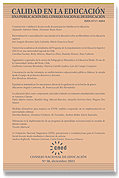The National Diagnostic Evaluation (END): perceptions and considerations for Initial Teacher Training from students and career directors
DOI:
https://doi.org/10.31619/caledu.n59.1410Keywords:
Initial Teacher Training, Educational Policies, Accountability, Higher Education, National Diagnostic Evaluation (END)Abstract
The article explores the knowledge, assessments, expectations and recommendations of student teachers and their career managers regarding the centralized and standardized evaluation applied to them in Chile (National Diagnostic Evaluation, NDT) to assess the quality of initial training, considering that those evaluated have been largely overlooked in this policy. Utilizing a consecutive mixed design, we conducted individual interviews, focus groups and a survey. The findings offer novel insights for revising the policy. While the participants express support for a national evaluation, they understand it primarily as a tool for improvement. Critiques center around the current instrument’s limitations in terms of standardization and the absence of practical performance evaluation. They also highlight concerns about insufficient information on the instrument and emphasize the need for a detailed description of results to facilitate interpretation and use for improvement. In conclusion, the study advocates for a comprehensive review of the multiple objectives of this evaluation, prompting reflection on the meaning and scope of evaluative mechanisms to strengthen initial teacher training.
Downloads
Published
Issue
Section
License
Copyright (c) 2023 Calidad en la Educación

This work is licensed under a Creative Commons Attribution 4.0 International License.
Authors retain their Copyright and only transfer a part of these to the journal, accepting the following conditions:
Authors keep their rights as authors and guarantee the right to the journal for the first publication of their work, which is simultaneously subject to the Creative Commons Attribution license allowing third parties to share the study accrediting the author and first publication in this journal.
Authors may adopt other non-exclusive license agreements for distribution of the version of the published work (e.g. inclusion in an institutional thematic file or publication in a monographic volume) accrediting initial publication in this journal.
Authors are allowed and recommended to share their work over the Internet (e.g. in institutional telematic files or their website) before and during the submission process, which may lead to interesting exchanges and increased citation of the published work. (See The effect of open access).

